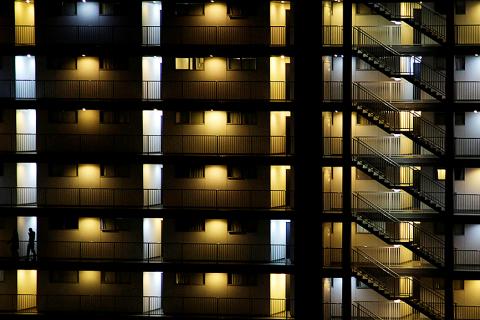The IMF yesterday called on New Zealand to reconsider a controversial plan to ban foreigners from buying residential property, saying that the move could discourage foreign direct investment necessary to build homes.
The IMF offered an upbeat view on New Zealand’s economic outlook, despite a recent slew of soft data, and said the housing market was on course for a soft landing as price gains moderated.
Foreign ownership has attracted criticism as New Zealand grapples with a housing crisis that has seen average prices in Auckland almost double in the past decade and rise more than 60 percent nationwide.

Photo: Reuters
In its annual assessment of member nations’ economies, the IMF said that New Zealand’s ban was unlikely to help much in making housing more affordable.
“This ban on foreign home ownership could discourage potential foreign direct investment that could help build more houses,” the IMF said in a staff report.
Other policies, such as tax incentives and the government’s “Kiwibuild” program to build affordable homes, would be enough to address a shortage of housing, it said.
Many directors of the IMF’s executive board “encouraged the authorities to reconsider” the ban, a summary of IMF discussions showed.
New Zealand authorities disagreed with its assessment on the view the ban was needed to prevent foreign investment driven by “unproductive speculation,” the IMF report said.
While housing prices remain a contentious political topic, their increases have slowed throughout last year on central bank mortgage lending restrictions and foreigners’ weakening demand.
Sky-high prices might also be hurting demand. Housing prices rose by an annual 5.7 percent last month, slowing from 6.9 percent in the previous month, data showed.
Slowing economic growth might further weigh on demand, although the IMF said the outlook was favorable with growth expected to remain at about 3 percent in the near term.
“While housing demand fundamentals remain robust, the soft landing in the housing market should continue, given gradually increasing supply,” it said.
Foreigners bought only about 3 percent of properties nationwide, but targeted hotspots such as central Auckland, where one in five properties were sold to foreigners, government data showed.
The government last month rewrote a proposed law on the ban to relax some regulations on foreign ownership, following concerns the ban could hurt foreign direct investment.
The law is expected to take effect by the end of this year, upon approval by the legislature.

PERSISTENT RUMORS: Nvidia’s CEO said the firm is not in talks to sell AI chips to China, but he would welcome a change in US policy barring the activity Nvidia Corp CEO Jensen Huang (黃仁勳) said his company is not in discussions to sell its Blackwell artificial intelligence (AI) chips to Chinese firms, waving off speculation it is trying to engineer a return to the world’s largest semiconductor market. Huang, who arrived in Taiwan yesterday ahead of meetings with longtime partner Taiwan Semiconductor Manufacturing Co (TSMC, 台積電), took the opportunity to clarify recent comments about the US-China AI race. The Nvidia head caused a stir in an interview this week with the Financial Times, in which he was quoted as saying “China will win” the AI race. Huang yesterday said

Japanese technology giant Softbank Group Corp said Tuesday it has sold its stake in Nvidia Corp, raising US$5.8 billion to pour into other investments. It also reported its profit nearly tripled in the first half of this fiscal year from a year earlier. Tokyo-based Softbank said it sold the stake in Silicon Vally-based Nvidia last month, a move that reflects its shift in focus to OpenAI, owner of the artificial intelligence (AI) chatbot ChatGPT. Softbank reported its profit in the April-to-September period soared to about 2.5 trillion yen (about US$13 billion). Its sales for the six month period rose 7.7 percent year-on-year

MORE WEIGHT: The national weighting was raised in one index while holding steady in two others, while several companies rose or fell in prominence MSCI Inc, a global index provider, has raised Taiwan’s weighting in one of its major indices and left the country’s weighting unchanged in two other indices after a regular index review. In a statement released on Thursday, MSCI said it has upgraded Taiwan’s weighting in the MSCI All-Country World Index by 0.02 percentage points to 2.25 percent, while maintaining the weighting in the MSCI Emerging Markets Index, the most closely watched by foreign institutional investors, at 20.46 percent. Additionally, the index provider has left Taiwan’s weighting in the MSCI All-Country Asia ex-Japan Index unchanged at 23.15 percent. The latest index adjustments are to

CRESTING WAVE: Companies are still buying in, but the shivers in the market could be the first signs that the AI wave has peaked and the collapse is upon the world Taiwan Semiconductor Manufacturing Co (TSMC, 台積電) yesterday reported a new monthly record of NT$367.47 billion (US$11.85 billion) in consolidated sales for last month thanks to global demand for artificial intelligence (AI) applications. Last month’s figure represented 16.9 percent annual growth, the slowest pace since February last year. On a monthly basis, sales rose 11 percent. Cumulative sales in the first 10 months of the year grew 33.8 percent year-on-year to NT$3.13 trillion, a record for the same period in the company’s history. However, the slowing growth in monthly sales last month highlights uncertainty over the sustainability of the AI boom even as